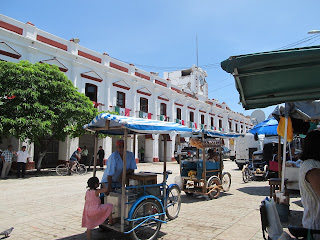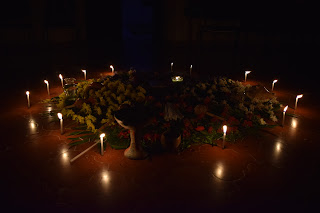June 22, 2017
Elena Huegel
San Cristóbal de las Casas
México
The Other Side of the Sun
I had spent the day thinking about
the back and forth flow of migrants through this historic city known to this
day by the Mayan Tseltal and Tsotsil people as "Jovel" or
"Jobel" (The Valley of Tall
Grass) and registered on maps as San Cristobal de las Casas. Each new wave of residents over the centuries
has renamed the city.
The Mexicas, natives from Central
Mexico, called it "Hueyzacatlán" ("Beside the Tall Grass"
in Náhuatl) while the Spaniards, who took the valley away from the Tsotsiles,
named it "Villa Real de Chiapa" (Royal Village of Chiapa) after the
indigenous Chiapan people who preferred
to jump off a cliff rather than submit to the conquistadores.
Colloquially, the city was called,
"Chiapa of the Spaniards" while the nearest town down from the lush,
cool, mountains and in the sweltering lowlands where there were large
plantations was called "Chiapa of the Indians."
Those who can claim Spanish heritage in this
city are still part of the inner power circle and call themselves "los auténticos
coletos" (the authentic pony tails - after the male fashion of long, tied
back, hair in colonial times.)
I don´t know why in the year 1529, the city
was renamed "Vicious City" or "City of Vices," but I can
imagine...
In 1531, it was decided,
understandably, to change the name again to San Cristóbal de los Llanos
(plains) after the patron saint of the town.
The name was changed again to the
"Royal City of Chiapa", then to the "City of San
Cristobal." This name was then
modified to "San Cristobal de las Casas" after Friar Bartolomé de las
Casas, who was "converted" by the cruelty he saw during the conquest
and so became a defender of the rights of the original peoples and one time
Bishop of Chiapas.
Again the name was changed to
"Ciudad de las Casas" and eventually back to "San Cristobal de
las Casas," the name that remains to date.
For nearly five hundred years,
people have come and gone from San Cris, as the tourists fondly call it today,
migrating in and out for different reasons.
On any given day, as I walk down the main street, closed to vehicular
traffic, I can hear people speaking Tsotsil, Tseltal, German, Italian, French,
English, Chinese, and a wide variety of accents from the different Spanish
speaking countries. Some are permanent residents while others are tourists or
merchants who come into the city to sell their wares. There are people from
Guatemala, el Salvador, Honduras, Cuba and other Caribbean and Central and
South American countries making their way north, through Mexico, in what is
considered the most dangerous leg of their painstakingly slow journey to the
United States. Now a days, the flow is
reversing, and people either forced or choosing to leave the United States are
seeking more favorable living conditions in Mexico. Some are settling in San
Cristobal while others are trying to return
to what used to be home in countries further south.
After I had spent a morning last
week writing materials on dignity for the local migrant shelter, I walked down
the pedestrian street on the way to my Tseltal language and culture class. First I came across a little boy, maybe 5 or
6 years old, sitting in front of an outdoor cafe on top of a large cardboard box wrapped in newspaper, a
folded piece of paper with a couple of coins on it laying on the pavement in
front of him. With great vigor and
showmanship, he was wailing out a song and banging on the box as if were a
drum. His mother, with the dress of a woman
from one of the Tsotsil communities, was selling crafts nearby. Some of the patrons of the café were smiling;
some dropped another couple of coins on the paper. What he lacked in musical ability, he
certainly made up for with serious dedication in helping to earn a living for
his family.
Along the next block, I came across
another singer. This young man with his
unmistakable Argentine accent, was singing "The Other Side of the
Sun" by Albert Louis Hammond and Janis Ian in a beautiful
"folksy" voice while skillfully playing the guitar. Sitting next to him on the curb and singing along in a wide
variety of keys and rhythms was a very intoxicated man, toothless and in
tattered clothes. The Argentine was not
in the least bit fazed by the discordant accompaniment. He smiled at the man beside him, swaying in
sync to the music, and then in an instant, smiled up at me, locking his gaze
with mine as if to say "I honor this man´s dignity as well as
yours."
I stopped and listened to the words
and was reminded that in one way or another we are all pilgrims on the path,
migrants trying to find a way home, through the tall grass, and back from the
other side of the sun.
Even as I'm leaving
I'll never stop believing you are the one
Who
can make me laugh and can bring me back
From
beyond the other side of the sun,
Beyond
the other side of the sun.
Tsajtayamel jbeel
- Take care of yourself your path. (Tseltal good-bye)
Elena











 jTatic Samuel, as he was lovingly known to all in this region of Mexico, was the visionary Bishop of the Catholic Church in San Cristobal de las Casas from 1959 to 1999. jTatic was the title the Mayan descendants, the Original Peoples of Chiapas, gave him and means "our dear father", a sign of respect and appreciation for his tireless work on behalf of the marginalized and the poor. There are many ways to describe the life and ministry of Bishop Samuel Ruiz, but there is a particular legacy that touches my life and the work of Global Ministries here in this southern state of Mexico on the border with Guatemala. jTatic Samuel knew he would not be around forever, but he saw his call to "see that justice is done, let mercy be (his) first concern, and humbly obey (his) God" (Micah 6:8) as growing and expanding in the organizations he helped to create during his time serving the church and the broader community.
jTatic Samuel, as he was lovingly known to all in this region of Mexico, was the visionary Bishop of the Catholic Church in San Cristobal de las Casas from 1959 to 1999. jTatic was the title the Mayan descendants, the Original Peoples of Chiapas, gave him and means "our dear father", a sign of respect and appreciation for his tireless work on behalf of the marginalized and the poor. There are many ways to describe the life and ministry of Bishop Samuel Ruiz, but there is a particular legacy that touches my life and the work of Global Ministries here in this southern state of Mexico on the border with Guatemala. jTatic Samuel knew he would not be around forever, but he saw his call to "see that justice is done, let mercy be (his) first concern, and humbly obey (his) God" (Micah 6:8) as growing and expanding in the organizations he helped to create during his time serving the church and the broader community.



